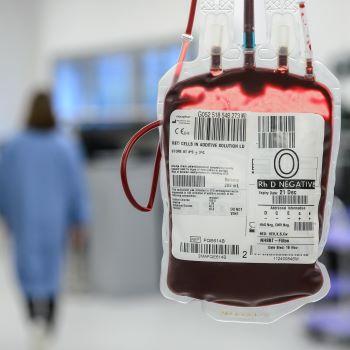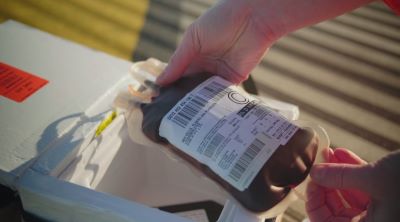15 Dec 2022

A new clinical trial in the UK began today (15 December), with air ambulances across the country carrying ‘whole blood’ instead of separate red blood cells and plasma for the treatment of critically injured patients at risk of bleeding to death.
The SWIFT (Study of Whole blood In Frontline Trauma) trial is led by NHS Blood and Transplant and currently involves 10 UK air ambulance charities in partnership with the Ministry of Defence and Air Ambulances UK.
If the trial shows patient benefit, it holds the potential to reduce trauma deaths in civilian accidents, on the battlefield and in any situation where delaying a transfusion by seconds or minutes could be critical.
Whole blood is taken from the arm of a donor and includes all the different blood components, such as red blood cells, plasma and platelets. Whole blood may work better for trauma patients because it contains platelets: platelets are the cell fragments which help the blood to clot. They are difficult to store – between 20C and 24C – and have a short five-day shelf life. They also need constant gentle movement to help them stay oxygenated, meaning they are very difficult to use outside of hospitals. Currently, air ambulance patients receive plasma and red blood cells, but not platelets.
Another benefit of carrying whole blood is carrying and transfusing one blood product could be lighter and simpler. It could enable faster treatment, at a time when every second counts. It could make the transfusion process easier and reduce risk, a crucial benefit in difficult and fast-moving incidents.
There is already past evidence that whole blood could lead to reduced mortality and reduce the amount of blood needed after patients arrive at hospital. However only a full randomised controlled trial such as SWIFT can provide the definitive answers.
London’s Air Ambulance Charity is proud to be a part of the SWIFT trial. The trial went live with our ambulance service – the only air ambulance operating in London – and will be rolled out to the nine other air ambulances over the next few months.

The other air ambulances participating are Air Ambulance Kent Surrey Sussex, Dorset and Somerset Air Ambulance, Essex and Herts Air Ambulance, Great North Air Ambulance, Great Western Air Ambulance, Hampshire and Isle of Wight Air Ambulance, Magpas Air Ambulance, North West Air Ambulance and Thames Valley Air Ambulance.
Funding for the trial has been provided by NHSBT, the air ambulance charities and the Ministry of Defence.
Over a two-year period, SWIFT will recruit 848 patients. One group of patients will continue to be given transfusions of red blood cells and plasma separately, with platelets given if needed after arrival at hospital. The other group of patients will receive transfusions of whole blood. The trial will compare survival and the amount of blood needed over the first 24 hours after injury.
Dr Laura Green, co-Chief investigator for SWIFT and Consultant in Haemostasis and Transfusion Medicine at NHS Blood and Transplant, said: “The role of air ambulances in providing blood transfusions at the scene of an incident is crucial – delivering the most challenging treatments in the most challenging environments.
“Any delay to starting transfusion during traumatic blood loss can reduce the chances of survival. We hope that SWIFT will show there are logistical and procedural benefits in giving a blood transfusion of all of the components in a single bag – and ultimately improved outcomes for patients.
“We are grateful to be working in partnership with air ambulance organisations and the Defence Medical Services to drive innovation and provide even better care to critical patients. We are also incredibly grateful to our O Rh negative donors, whose universal donor blood is critical in trauma transfusion - including in this trial.”

